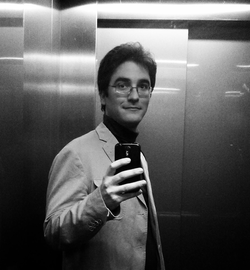 Alejandro Santacreu, founder of Puzzlephone Alejandro Santacreu, founder of Puzzlephone From Alicante to Helsinki. This is the travel of Alejandro Santacreu since he finished studying a grade of technical bachelor at High School in Alicante until he started working in Puzzlephone in Helsinki. A startup which, since its #ideation in 2012 have advanced to Phase -1, the #concepting with a clear and meaningful target on direction for the next 3 years and with milestones on how to get there. How would you describe Puzzephone? Puzzlephone reduces #ewaste improves #repairability and #obsolescence and represents a new way of engineering and manufacturing. You come from an entrepreneurial family. What did you learn from your parents in that sense? Be cautious (father), the Evil in the details (father) and nobody is indispensable (mother). What were you doing before Puzzlephone? I was and I am studying at Laurea University of Applied Sciences in Espoo, Helsinki. Before that I was working as Product Manager of mobile internet devices at Energy Sistem, an Spanish consumer electronics brand. Mobile phones market is a hard game. Also, you are going in the opposite direction. What is your ace in the hole? We are aligned with the incoming new ways of manufacturing and new emerging and game-changing technologies that will move the value, at least part of it, from the traditional big brands to a more organic ecosystem of developers openly linked to their suppliers and partners and less dependant on IPR. Where do you see Puzzlephone in 5 years? As a forerunner and at the same time an inevitable consequence of the early days of this new Industrial Revolution that we are living, sometimes without even notice it. What technologies are you using to build first prototypes? What is technically the most challenging part of building Puzzlephone? The main spatial and mechanical aspects are being developed with quick 3D sketching software like SketchUp, then our Industrial Engineer “industrialized” (in our internal slang) the concept introducing all the necessary aspects for 3D printing or CNC milling such as tolerances, mechanical interference or coatings thickness at the same time our “artistic” partners (like the Finnish Design Studio Siltanen & Sandberg or our marketing supporters from Kinetic Pixel, a Finnish/Spanish company located nearby, in Helsinki) work on those concepts from a purely creative point of view, unconstrained by technical limitations. At that phase they use classical and well known profesional solutions for 3D rendering, video-editing and so forth. Finally we will reach, hopefully soon, a third phase where engineering and art will meet and decide how to combine both approaches in a balanced way and always keeping in mind the core principles of Puzzlephone which are: upgradable, repairable and reliable. The biggest technical challenge is to solve the disconnection between hardware and firmware, the lack of a "Wintel standard" is harming the UX in terms of usability and security. and it is also increasing the obsolesce of the devices by making its effective after-sales support almost impossible. To fix that requires to convince some big players that it will be good for them too, but that’s connected with a new paradigm in the actual business model that, at some point, requires nothing less and nothing more that the willing of making the things better. What kind of supports/partnerships are you achieving? Finland public entities has provide great support in the form of both financial and networking. Starting with the Laurea Entrepreneurship Society and Laurea University of Applied Sciences, the great people from the Cambridge Judge Business School and the amazing Venture Camp intensive training program. Special thanks to Alan Barrell, Jack Lang and to our mentor Steve Mallinson. The people from Otaniemi, a Finnish office for the development of local business in Espoo area and the NewCo Factory, a business acceleration service launched by the City of Helsinki quiet recently. The University of Aalto has been also supportive by providing their legal advisory services. What are some of the challenges you face as founder on a day to day basis? Finding the so called "smart money”. We do not simply need investment, we need the right investor. Ecological factors have been always there but the technological marketeers have just started to experienced how this trend is slowly becoming part of the purchase decisión. We are still far away from that but getting there, we are witnessing the arise of the “Ethical Customer” as a consequence on how the critical point reached by the IT technologies (fast, relatively cheap and ubiquity) are making us aware on the importance of the processes behind our consumer behaviours, so just by saying: “I want to make a better device which lasts longer and it is easy to repair and so forth” it is not enough right now. At the same time new paradigms delivered by new technologies are always hard to scope and locate in the big picture and any proposal based on how are those going to behave is usually take with a huge dose of skepticism. You are based in Finland. What’s the startup ecosystem like there? There are lots of small and medium software startups but just a pretty reduced bunch of hardware pioneers, the days of massive outsourcing maybe are fading out but the re-location wave has barely hit the Finnish shores… by now ;) Can you convince the reader to buy Puzzlephone in under 100 words? How often do we place our phones on the table? Phones are our virtual and physical connection with the world and the people. It represents the things we care about. Are we all the same? Do we all have and share the same tastes? And at the same time: Do we all care about the world and the people? Are you aware of the value of your own personal statements? Then we have something in common. Your big mistake? Mistakes are what they are until we find some value on them. I am a rational believer of the “all is for good” so there are a lot of mistakes in my backlog but I am positive about finding, sooner or later, a useful meaning for them. This is the golden age of design, and startups as well as established corporate giants need to excel in the user experience to succeed in the 21st century. Bangalore recently hosted a superb masterclass and conference on user experience, UX 2014, organised by Peepal Design and the global UX Alliance. Experts from the US, Ireland, India, South Africa, Brazil, Switzerland, Japan, Australia, France, Canada, Poland and Italy addressed over 300 delegates at the event. Here are my Top 15 takeaways from 15 of the experts who presented at UX 2014. 1. Align UX with business metrics 2. Mobile is the centrepiece 3. Include UX approaches in project management certification 4. Address current needs but also anticipate future needs 5. Use visualisation techniques to map UX impacts 6. Target the UX message to a broader audience 7. Focus on business goals and not just digital content 8. UX helps you stay competitive 9. Embed UX in transactional activities 10. UX applies to digital and non-digital domains 11. Test, learn, test, learn 12. UX is about relationships 13. Localise, localise, localise 14. Blend art and science in UX 15. Tackle the RX to bring UX into rural India In sum, the conference and masterclasses delivered a wealth of learnings to the attendees, even making it difficult for them to choose between the three parallel tracks! The conference threw up a fascinating range of questions which can be addressed through research publications and at future such events. How can resource-strapped startups not lose out on the UX edge? What approaches work best in dealing with the ‘politics’ of UX in an organisation, when not all stakeholders sees eye to eye on the solution? What term works best to describe UX when users are no longer just users but co-creators of products and services? Read the whole article in yourstory.com This is an edited version of an post originally posted at yourstory.com, by Madanmohan Rao. You are free to re-edit and repost this in your own blog or other use under Creative Commons Attribution 3.0 License terms, by giving credit with a link to www.startupcommons.org and the original post.
 Photo Credit: Pivot East Photo Credit: Pivot East Africa Startup Ecosystem in on fire thanks to Pivot East, one of the most prestigious mobile startup competitions and conferences held annually since 2011. PIVOT East aims to catalyze the growth of mobile startups, so as to amplify and consolidate the gains of East Africa’s Mobile developer and entrepreneurship ecosystem. The PIVOT EAST competition is a six month long program of targeted educational workshops for mobile entrepreneurs and business advisory session and It culminates in the top 25 mobile startups pitching to investors and partners at a finalists conference. The competition has five categories with each having five finalists pitching to a rich audience of Investors, Development Partners, Government Representatives, Telecoms Operators and other key industry players from East Africa and beyond. The categories include:
The 2013 competition attracted 130 startups applications from Across East Africa, with 88 applications from Kenya, 30 from Uganda, 10 from Tanzania, one from Rwanda and one from Ethiopia in the Finance, Entertainment, Society, Utility and Enterprise categories. Five category winners were announces, one from each category during the gala dinner. Expectations for this year are very high and that’s the reason why they have partnered with 8 tech hubs from across the region who will play a key role in Mobilizing startups and developers in its communities to submit entries to the PIVOT East startups platform and conduct outreaches and workshops on our behalf.The hubs include Outbox (Uganda), Hive Colab (Uganda), KINU (Tanzania), Buni (Tanzania), kLab (Rwanda), iceaddis (Ethiopia), iBiz Africa (Kenya) and C4DLab (Kenya). The call for applications for Pivot East 2014 Competition has been opened up until 11th April 2014 where 25 finalists in the competition will receive training, coaching and mentorship on how to arrive at repeatable and scalable business models. The finalists will also receive training and coaching on how to pitch to investor. Stay tuned to the whole competition and discover amazing startups in Nairobi. We are also preparing a next interview with the Producer for Pivot East 2013, Moses Kemibaro and an informal talk with one of the participating startups last year. 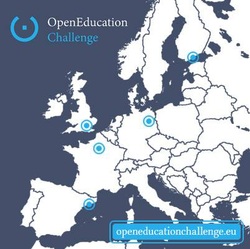 Photo credit: Open Education Challenge Photo credit: Open Education Challenge There’s no doubt about how important education is for economic growth and so do startups. What if we combine both of them? This is an option that deserves to be supported, don’t you think? Innovators in the education world now have a new opportunity to make a difference in the way we teach and learn. Open Education Challenge is the new European Incubator for Innovation in Education that provides an opportunity for anyone with a great idea to develop it into a business, with access to funding and mentorship along the way. The Challenge invites innovators to submit their proposal by 17 March 2014. Proposals can come from registered companies or aspiring entrepreneurs at the ideation stage. Twenty finalists will get a chance to go to Barcelona to pitch their idea, and the 10 winners will participate in the 12-week incubator. The intensive coaching sessions will take place in five successive cities; Barcelona, Paris, London, Berlin, and Helsinki. Each team will be mentored by an expert from the field of education, entrepreneurship, or technology. The winners will have access to up to €20.000 in seed capital, and at the end of the incubator they will present their projects to the Open Education Investment Club with the possibility to secure additional financing. Hurry up! Check some tips for writing your application, join this exciting project and make a difference in education. 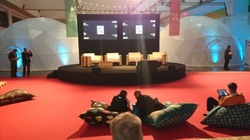 Photo Credit: Startup Commons Photo Credit: Startup Commons First time for 4YFN, a satellite event created by Mobile World Capital Barcelona that provided last February a great experience for key stakeholders of startups ecosystems and mainly focused on helping entrepreneurs get to the next level. I have to say that I felt as a boy in amusement park because many cool startups and important organizations that are supporting entrepreneurship were there and it is always a great chance to stay tuned to what others are doing. In general, It was a good format where you had multiple choices to take the most from the event: talks, workshops, conferences, pitches, showrooms, etc. and where every corner was a suitable place to networking and business cards were the main currency, regardless of the moment or your profile. 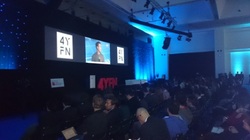 Photo Credit: Startup Commons Photo Credit: Startup Commons A startup ecosystem is in fact a social capital and an effective networking and buzzing is key to share and spread experience, knowledge, talent and many other resources and to help startups to get to the next level. In this direction, it would be fantastic if we take the most from the power of crowd in events like 4YFN. I could attend to different pitches from startups and in general it was an unidirectional event with a big lack of participation from the attendees. It was a pity because each one of us could have been mentors to every single startup, providing them feedback about customer segments, value proposition, pitching, etc. that startups could analyze later in order to learn and take next steps like getting in contact with each one of them, making more effective the post-event. Maybe, there would be people who felt shame to speak to an audience or maybe didn’t understand the project or maybe it was just a matter of disinterest. 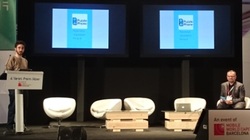 Photo Credit: Startup Commons Photo Credit: Startup Commons In any case, we and organizers should facilitate for next events a better bidirectional communication (CrowdPitching) and boost an important activity that you can find in the heart of any startup ecosystem: the conversation and the feedback among different members. Doing this we will help startups to find the right resources for them for every single stage in which they are and with the same spirit as Lars Buch from StartupBootCamp said about accelerators: “Accelerators have to help startups not to make many mistakes” Great work 4YFN and see you next year! This is an originally posted by Óscar Ramírez. You are free to re-edit and repost this in your own blog or other use under Creative Commons Attribution 3.0 License terms, by giving credit with a link to www.startupcommons.org and the original post
|
Supporting startup ecosystem development, from entrepreneurship education, to consulting to digital infrastructure for connecting, measuring and international benchmarking.
Subscribe for updates
Startup ecosystem development updates with news, tips and case studies from cities around the world. Join Us?Are you interested to join our global venture to help develop startup ecosystems around the world?
Learn more... Archives
December 2023
Categories
All
|
- Startup Commons
- Business Creators
-
Support Providers
- About Support Providers
- Learn About Startup Ecosystem
- Startup Development Phases
- Providing Support Functions
- Innovation Entrepreneurship Education
- Innovation Entrepreneurship Curriculum
- Growth Academy eLearning Platform
- Certified Trainers
- Become Growth Academy Provider In Your Ecosystem
- Growth Academy Training On-Site By Startup Commons
-
Ecosystem Development
- About Ecosystem Developers
- What Is Startup Ecosystem
- Ecosystem Development
- Ecosystem Development Academy eLearning Platform
- Subscribe to Support Membership
- Ecosystem Operators
- Development Funding
- For Development Financiers
- Startup Ecosystem Maturity
- Case Studies
- Submit Marketplace App Challenge
- Become Ecosystem Operator
- Digital Transformation
- Contact Us
- Startup Commons
- Business Creators
-
Support Providers
- About Support Providers
- Learn About Startup Ecosystem
- Startup Development Phases
- Providing Support Functions
- Innovation Entrepreneurship Education
- Innovation Entrepreneurship Curriculum
- Growth Academy eLearning Platform
- Certified Trainers
- Become Growth Academy Provider In Your Ecosystem
- Growth Academy Training On-Site By Startup Commons
-
Ecosystem Development
- About Ecosystem Developers
- What Is Startup Ecosystem
- Ecosystem Development
- Ecosystem Development Academy eLearning Platform
- Subscribe to Support Membership
- Ecosystem Operators
- Development Funding
- For Development Financiers
- Startup Ecosystem Maturity
- Case Studies
- Submit Marketplace App Challenge
- Become Ecosystem Operator
- Digital Transformation
- Contact Us


 RSS Feed
RSS Feed

